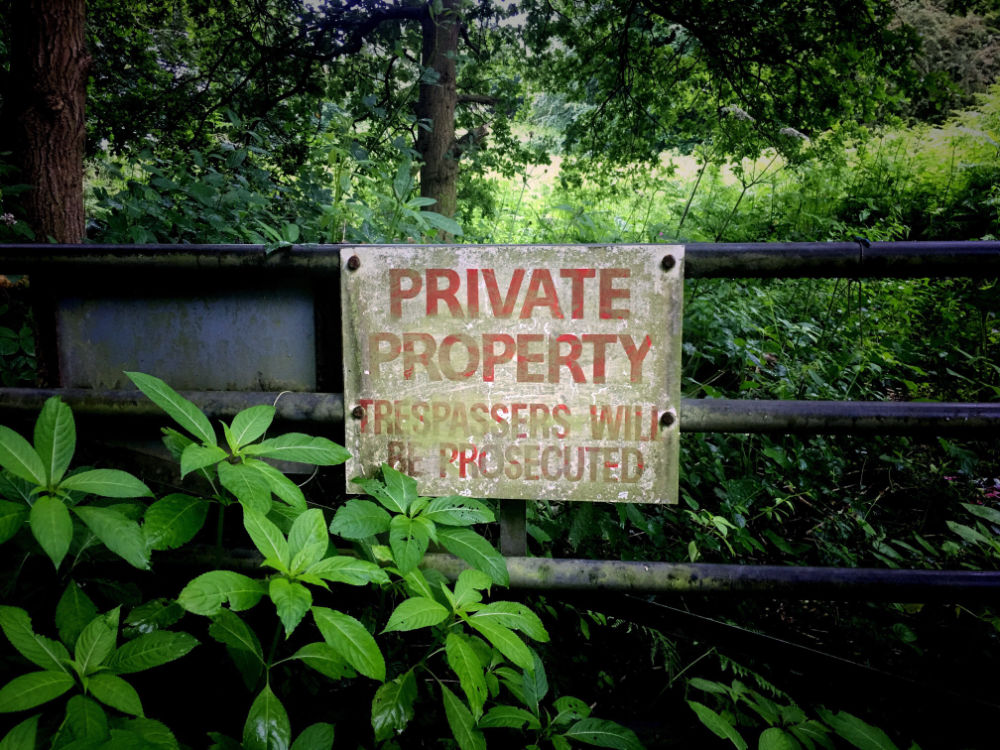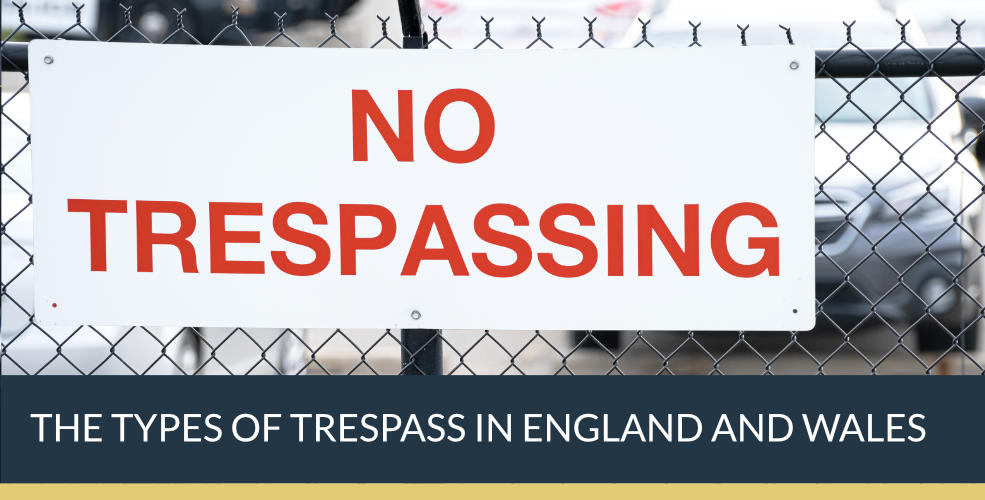The types of Trespass Laws in England and Wales
Understanding Civil vs. Criminal Trespass Offences
The concept of trespass is one of the most misunderstood areas of law in England and Wales, particularly when it comes to its application in investigative and security-related professions. While many assume trespass automatically equates to a criminal act, the reality is more nuanced. Trespass is, in most cases, a civil offence, although under certain circumstances, it does become criminal.
For private investigators, understanding the distinction is not merely academic; it is crucial to professional integrity, risk management, and legal compliance. Acting outside of the law can jeopardise cases, undermine reputations, and even lead to criminal liability. At Titan Private Investigation Ltd, our ethos is built on operating within the law at all times. We are frequently asked about what constitutes trespass, what the implications are, and how investigators can avoid missteps.
This article sets out to clarify those points. By exploring the definitions, consequences, and practical real-world scenarios surrounding trespass, we aim to provide investigators, organisations, and individuals with a clearer understanding of the boundaries they must respect.
Civil Trespass: The Foundation
What Constitutes Civil Trespass?
Civil trespass laws are perhaps the simplest form to explain: it occurs when a person enters another’s land or property without permission. It does not matter whether damage is caused, whether intent was malicious, or whether the individual left quickly, the very act of being somewhere they shouldn’t be constitutes trespass.
Examples include:
- Walking onto a neighbour’s garden without consent.
- Entering a private car park reserved for staff.
- Stepping onto building scaffolding without authorisation.
For investigators, risks arise when undertaking surveillance operations, delivering process-serving, or attempting discreet approaches. The very act of setting foot on private driveways, car parks, or fenced private land can cross the legal threshold into trespass.
Consequences for the Trespasser
Unlike criminal offences, civil trespass does not usually result in arrest or a police-led prosecution. Instead, it is the responsibility of the landowner to pursue legal redress, typically through the civil courts.
In practice, remedies tend to be modest. Courts may issue:
- Injunctions – legally preventing the trespasser from returning.
- Damages – monetary compensation, though often symbolic unless loss or damage can be quantified.
- Possession Orders – requiring removal of trespassers in cases of unlawful occupation, such as squatting on land.
The reality, however, is that civil processes can be slow and, at times, ineffective. Many landowners feel the expense and delays outweigh any benefit, particularly when the trespass causes minimal harm. This is why repeat trespassers or protest groups sometimes exploit the slowness of civil remedies.
The Role of Police in Civil Trespass
Police Powers (or Lack Thereof)
Civil trespass remains firmly a civil matter, and the police have very limited powers to intervene. Unless an element of criminality is involved — for example, damage to property, threats of violence, or theft — officers can do little more than advise the parties involved.
The “Attitude Test” in Practice
That said, human interaction and discretion play a significant role. While the police might not automatically act, if an individual is uncooperative or confrontational, officers may look for alternative offences to apply. This “attitude test” is not enshrined in statute but is well understood in practice.
For instance, if a private investigator were discovered placing a tracking device on a vehicle while standing on private property without consent, the police could argue interference with a motor vehicle, potentially escalating the situation into a criminal investigation. Even if such a charge is later dismissed, the damage to the investigator’s credibility can be lasting.
Thus, professionalism, courtesy, and transparency when confronted by police are essential. Remaining calm and respectful often ensures matters remain civil rather than escalating.

Criminal Trespass: A Stricter Framework
Defining Criminal Trespass Laws under Legislation
While most trespass is civil, there are specific scenarios where it becomes criminal. One of the most significant legislative developments in recent years has been the Police, Crime, Sentencing and Courts Act 2022, which enhanced police powers in dealing with trespass.
Criminal trespass most commonly arises in the following contexts:
- Unauthorised encampments: Preventing groups or individuals from establishing temporary settlements on private or public land.
- Squatting in residential properties: Since 2012, squatting in houses has been a criminal matter, punishable by fines and imprisonment.
- Protest activities: For example, activists obstructing infrastructure such as railways, airports, or energy facilities.
- Hunt sabotage and rural disruption: Entering private estates to disrupt lawful hunts or rural pursuits.
Practical Consequences
Unlike civil trespass, criminal trespass can result in:
- Arrest by police.
- Immediate removal from the land.
- Criminal charges, fines, or even imprisonment in serious cases.
For investigators, this highlights the importance of maintaining absolute clarity about where trespass sits within the legal spectrum. What may initially appear as a minor infraction could, under certain conditions, amount to a serious criminal charge.
Implications for Private Investigators
Conducting a Legitimate Interest Assessment (LIA)
At Titan, every potentially intrusive investigative action begins with a Legitimate Interest Assessment (LIA). This process ensures each operation complies not just with trespass laws, but also with broader privacy, data protection, and human rights considerations.
Questions we ask include:
- Is the action proportionate to the client’s needs?
- Is there an alternative that avoids entering private property?
- Does the action risk escalating into criminal trespass?
By thoroughly documenting rationale and alternatives, investigators can both protect themselves legally and demonstrate ethical decision-making.
Common Risk Scenarios
- Vehicle Tracking: Attaching devices often requires proximity to cars parked on private land. Without the owner’s permission, entering a driveway constitutes trespass. At Titan, we would not breach this boundary but would instead explore lawful alternatives.
- Surveillance Near Businesses: Following individuals from workplaces may involve entering car parks or foyers. This creates both trespass risks and potential confrontations with security personnel.
- Residential Surveillance: Monitoring suspected cohabitation or relationships could tempt investigators onto private grounds. Legal compliance requires resisting these shortcuts.
The Element of Luck vs. Planning
Successful investigation balances risk with planning. While unforeseen encounters occasionally arise — an unexpected door opening, a vigilant security system — careful preparation reduces these risks. Route planning, site recce work, and technology use all help investigators avoid overstepping into unlawful conduct.
Ethical and Professional Considerations
The Duty of Integrity
Private investigators are under a professional and moral duty to uphold integrity. Trespassing not only exposes investigators to potential legal consequences but also erodes public trust in the profession.
At Titan, our standards dictate that trespassing to secure information is unacceptable. Our reputation is built upon discretion, legality, and effectiveness. For this reason, we avoid actions that would compromise the company or its clients.
Reputation and Risk Management
Even a minor trespass allegation can have disproportionate reputational damage. Clients, the public, or regulatory bodies may view trespass as underhanded or unlawful, regardless of whether it is technically civil. For investigators, acting above reproach ensures professionalism is never questioned.
Final Thoughts on Trepass Laws in the UK
The law on trespass in England and Wales creates a clear distinction between civil and criminal offences. For most scenarios, trespassing is a civil matter, with limited remedies available to the landowner. However, under particular legislation — especially in cases of squatting, encampments, or protest-related activity — trespass becomes a criminal offence, with significant consequences.
For private investigators, the message is clear. Understanding these boundaries is critical not just for legal compliance but for protecting client trust and professional credibility. Titan Private Investigation Ltd advocates a principled approach: always conduct Legitimate Interest Assessments, always consider alternatives, and always operate within the law.
Ultimately, avoiding falling foul of trespass laws is about safeguarding one’s reputation as much as one’s legal standing. In an industry built upon discretion and professionalism, integrity is everything. At Titan, we do not gamble with “luck” or quick fixes. Instead, we prioritise lawful strategy, ethical consideration, and meticulous planning — ensuring we deliver results without ever compromising the trust placed in us.
About Titan Private Investigation Ltd
Titan Private Investigation Ltd is a leading provider of corporate and private investigation services in the UK. Based in Derby, the company serves clients nationwide, offering a full range of investigative solutions including surveillance, fraud investigation, digital forensics, and more. We are a private investigation agency with a reputation for professionalism, discretion, and delivering results. Titan is the trusted partner of choice for businesses seeking to protect their interests and ensure compliance.
London Private Investigations – Call the Titan Investigations London Office 020 39046622
Birmingham Private Investigations – Call the Titan Investigations Birmingham Office 0121 7162442
Cambridge Private Investigations – Call the Titan Investigations Cambridge Office 01223 662022
Derby Private Investigations – Call the Titan Investigations Derby (Head Office) 01332 504256
Leeds Private Investigations – Call the Titan Investigations Leeds Office 0113 4574066
Leicester Private Investigations – Call the Titan Investigations Leicester Office 0116 2436520
Nottingham Private Investigations – Call the Titan Investigations Nottingham Office 0115 9646950
Manchester Private Investigations – Call the Titan Investigations Manchester Office 0161 3023008
Sheffield Private Investigations – Call the Titan Investigations Sheffield Office 0114 3499400
Truro Private Investigations – Call the Titan Investigations Truro Office 01872 888706
Alternatively, you can contact us directly using our fully confidential contact form at enquiries@titaninvestigations.co.uk or chat directly using our Live Chat facility, and one of our UK Private Investigators will get right back to you.




















